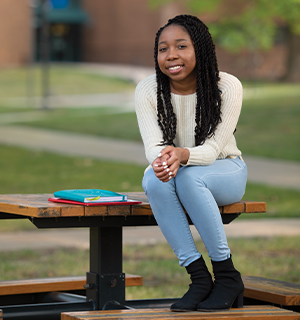To help students navigate the COVID-19 crisis, Drake University offers virtual and telehealth counseling appointments, as well as a variety of educational webinars and student support groups. Drake also works with Broadlawns Medical Center to offer students access to the hospital’s Psychiatric Urgent Care and Crisis Observation Center.
Writer: Megan Verhelst
Photographer: Duane Tinkey
When the pandemic forced colleges to close campuses and move classes online last March, Rachel Foster, now a 22-year-old senior at Drake University, hoped things would be back to normal by April.
But April came and went. Summer passed. Fall was quickly approaching, yet things still were still far from normal.

Foster, a psychology major from Gurnee, Illinois, was excited to speak at Drake’s annual Conference on Undergraduate Research in the Sciences, a resume-building opportunity. But the conference never happened. She watched as the coronavirus snuffed out other experiences she’d looked forward to.
Today, Foster thinks twice about making plans. “I kept getting disappointed,” she says. “Even now, I find it hard to make academic and career plans ahead of time … because I constantly have a voice in the back of my mind saying, ‘This plan will probably be negatively affected or canceled by the pandemic.’ ”
At times, Foster has felt hopeless, a feeling she shares with other college students. Recent studies show higher depression rates among college students as well as heightened concerns about the length of the pandemic.
Maggie Wildermuth, a fifth-year senior at Drake, says the pandemic has exacerbated her anxiety. “I’ve been having some trouble getting to sleep at a reasonable hour and I’ve been having panic symptoms at night,” she says. “I worry about catching COVID, but also giving it to a family member who is high risk.”
A Lifetime of Worries
When the pandemic hit in March, most college students were forced to navigate a lifetime of worries in just a few months. Job losses, changes in living arrangements, canceled internships, online classes, and a constant fear of exposure led to increased anxiety and feelings of helplessness, experts and students say.
“College is like running a marathon,” says Kyle Votroubek, staff therapist at University of Iowa Counseling Services. “I don’t think people realize how much stress college students were already under, then [COVID] happened.”
When Drake University surveyed students last spring on how the pandemic affected them, about 70% of respondents reported concerns with their mental health, according to Greg Lengel, a clinical psychologist at Des Moines Pastoral Counseling Center and an assistant professor of psychology at Drake.
“With COVID, it’s not only the stress related to the disease but the impact it’s had on the job market, on careers and on the economy,” he says. “When students came into their senior year [in 2019], the future was looking bright, but then … everything was thrown in the air.”
As the summer came to a close, college students headed back to campus, eager to reclaim some sense of normalcy.
That didn’t happen.
Barely into the new academic year, Iowa City was declared a “full-blown pandemic hot spot,” according to a New York Times report on COVID-19 in college towns. Students complained they couldn’t get coronavirus tests. Maskless undergrads packed sidewalks and downtown bars, and similar scenes were seen at Iowa State University’s Greek row.
At press time in September, the University of Iowa was among U.S. college campuses with the most confirmed cases of COVID-19. The university had reported more than 1,600 confirmed cases, while Iowa State University had more than 900 and University of Northern Iowa had 115.
At most Iowa universities and colleges, students who lived on campus and tested positive for COVID-19 or came in contact with someone who did were asked to remain there in isolation or in “quarantine dorms.” They shifted to online learning while cutting off all in-person contact with friends, teachers and even food service.
Lack of Connection
This year’s freshmen started their college career on the heels of disappointment. After graduating from high school without attending proms, commencement ceremonies and other rites of passage, college offered little reprieve. Those who hoped to participate in campus activities or sports couldn’t, missing crucial opportunities to make new friends and connections, says Danielle Green, director of the Broadlawns-Drake Student Counseling Center.
Many first-year students are also living alone in college dorms because of the pandemic. “That reduces their ability to connect with a roommate and make some of those immediate relationships we associate with college,” Green says.
That loss of connection is one of the biggest factors affecting the mental health of college students no matter what year they’re in, experts say.
Due to their high levels of social media use, college students sometimes don’t know how to cultivate close connections in person, Green says. This means students may not feel like they have close personal relationships and are faced with learning how to “intentionally connect.”
“When familiarity is taken, how do I make friends?” Green said of students. “They are part of the most connected [generation], but also the most lonely generation—their relationships and connections look differently. They may know everyone who lives on their floor, but they’re not close to any of them.”
One of our core longings and needs as humans is connection, says Kent Schornack, director of leadership and counseling at Grand View University. “How do you establish a sense of community in an online environment?” he says. “Students didn’t come here to do online learning,” and it’s difficult for many of them not to have the opportunity to meet and socialize with their peers in person.
Support Systems
As virus cases climbed, colleges took measures to ensure students felt supported and had access to mental health resources. Among the first steps the University of Iowa took was transitioning to telehealth.
At Grand View, counselors have sought to “create a hopeful but realistic narrative” to help students keep perspective, Schornack says.
“We made every effort to reach out through social media. We made short video promos talking about mental health, how to stay well, and how to deal with crisis,” he says. “We also worked with faculty on how to teach through the screen rather than at it. A lot of thought was given to students to have to learn online.”
In addition to offering virtual and telehealth appointments, as well as a variety of educational webinars and student support groups, Drake shifted to a 24-hour counseling schedule for the first two weeks of the fall semester, meaning students could schedule an appointment and see a counselor within 24 hours.
Drake also works with Broadlawns Medical Center to offer students access to the hospital’s Psychiatric Urgent Care and Crisis Observation Center.
The university has encouraged staff to stay in touch with students, be “compassionate and empathetic,” and demonstrate flexibility in and outside the classroom, Lengel says.
“A lot of students are reluctant to reach out,” he adds, “but academic struggles only cause additional stress. Reach out and talk to someone if you need help.”
Maintaining Mental Health
Some students are also developing their own methods to manage anxiety. Drake student Wildermuth is studying for her grad school entrance exam, which she calls a “welcome distraction” from the rest of the world. She’s also focusing on self-care.
“I learned a long time ago that a lack of self-care exacerbates my anxiety, so I’ve been focusing on eating regular and reasonably healthy meals, hydrating and exercising,” she says. “I’ve been running and working out a lot.”
Tina Intarapanont, a 20-year-old junior at Drake University, finds comfort in her friends as she seeks to manage her anxiety and occasional panic attacks. “I think it’s important to know you’re not alone,” she says. “There are people going through the same experience as you.”
Some students say they also look for silver linings. Foster, the Drake senior studying psychology, says the pandemic has given her a chance to slow down and work on personal growth. “I try to focus on the positive,” she says.
Such resilience gives counseling staff at Iowa universities and colleges hope that most students will make it through the pandemic and all its challenges.
“Adversity introduces us to ourselves,” Grand View’s Schornack says. “It’s difficult, no question, but there are ways to grow from it, to understand who you are in the midst of challenge.”
“This is a traumatic experience for [students], but it’s had a positive impact as well,” Drake’s Green says. “They don’t feel bad about asking for help. They’re learning how to prioritize. They are learning what makes them passionate.”
The pandemic marks “a significant moment in history,” adds Lengel. “Those major events tend to have an impact on generations. But when we go through times like this, there’s a resilience that comes from it as well.”
Helpful Practices
Experts provide the following tips to maintain strong mental health during the pandemic.
Practice mindfulness.
Mindfulness is “intentional awareness of the present moment,” says Greg Lengel, a clinical psychologist at Des Moines Pastoral Counseling Center and an assistant professor of psychology at Drake. Pay attention to what’s going on around and within you. Identify your feelings, which helps you avoid getting stuck on negative thoughts. “You can’t change the past and you can’t change things you haven’t done yet,” he says. “Pay attention to the present—this is the time when you can do something.”
Find connection.
Talk to people, whether it’s online or in a socially distanced setting. Get back in contact with friends you’ve missed. Let your family and friends be there for you.
Establish a routine.
Create a schedule with “bookends”—one thing you do every morning and every night. Build in self-care.
Be good to your body.
Make time for physical activity. Go outside and eat healthy foods. Go to bed early and get plenty of sleep.
Write down your day.
Keep track of your thoughts and what you’re feeling. Putting your thoughts into words can sometimes help you better interpret how you feel.
Take breaks from news and social media.
While it’s good to stay informed, it can also be helpful to take breaks in order to curb overexposure to negativity and bad news.
Find a purpose.
Work on a hobby or toward a personal goal. “You don’t want to have a driftless, purposeless existence, especially if you’re struggling,” says Kyle Votroubek, staff therapist at University of Iowa Counseling Services. “There’s a difference between purposely doing nothing and doing nothing because there’s nothing else to do.”







